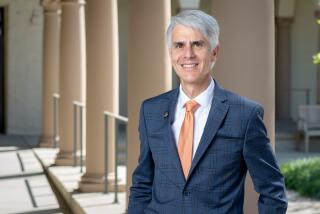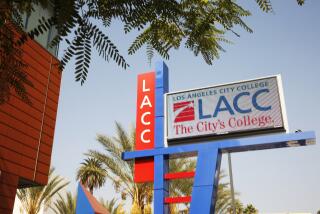The Visionary : Whittier College’s Ash Sees Great Things for Tiny School
- Share via
WHITTIER — When James L. Ash Jr. first arrived at Whittier College full of ideas on how the private liberal arts college should be run, uneasy students introduced him in the student newspaper as a comic strip character named El Presidente.
El Presidente as portrayed in the comic strip “The Dude” was a rigidly moralistic dictator, intent only on bringing down the irresponsible, partying student known as Dude.
But in less than a year, some of the student leaders who were most wary of Ash are labeling him a “visionary.” “El Presidente” has become a less harsh term, and this quiet little Quaker school on the hill isn’t so quiet any more.
Ash, 44, a historian and an ordained Presbyterian minister, has the school humming with his determination to market Whittier College as another Harvard or Yale.
During his inauguration March 16, Ash, who is the second-youngest president in Whittier College’s 101-year history, presented a vivid and challenging picture of what liberal education should be.
Faculty and staff say Ash is more than qualified for the job. He received his doctorate from the University of Chicago in 1976, specializing in U.S. social, religious and intellectual movements. He worked for 12 years at the University of Miami, where he served as vice provost for undergraduate studies and received every major teaching award given by the university, and played a leading role in boosting enrollment and strengthening undergraduate programs. His colleagues there described him as one of the brightest and most creative administrators in higher education today.
Although Whittier College has been listed consistently by U.S. News & World Report as one of the best in the nation, Ash said not enough people know about it. His job is first to make sure the word gets out, he said.
“He has brought to this school what we have needed for a long, long time--vision,” said Rafael Chabran, a professor of Spanish. “He has become a spokesman in a time when small liberal arts colleges need spokesmen.”
Some faculty and staff members say Ash was brave to leave a high-profile position in Miami to accept the Whittier post. In recent years the college has had well-publicized financial troubles, caused in part by a woefully low endowment fund and the high number of scholarships that Whittier students receive.
Because the school is private, it receives about half of its operating budget of about $22 million from undergraduate tuition. Enrollment dropped dramatically after the Whittier earthquake in 1987. Last spring, the administration was forced to lay off two professors and eliminate three unfilled faculty positions to balance the budget.
Perhaps its largest problem is its endowment, Ash said. Endowment growth is the No. 1 fund-raising priority. At $16 million, Whittier College’s endowment is far below that of most private schools. Ash said the fund must be pumped up to $100 million to generate enough revenue to help the school.
But the college is back on its feet, he said. The budget is balanced, three to six new faculty members will be hired during the next year and the campus will be renovated. Once everything is in place, Ash said, there is little preventing Whittier College from becoming a nationally known liberal arts college.
“Before I came here I made an academic judgment that this school is good enough to play in the big leagues,” he said. “I came here with my eyes open. They have showed me all the skeletons, and there have been no surprises. Every school I know suffers from an inferiority complex, and Whittier College is no exception.”
Though Ash was officially hired July 1, he began working to boost enrollment when he accepted the position in March.
Increasing freshman undergraduate enrollment, he said, is among his greatest challenges. Much of the school’s revenue comes from tuition, which this year is $11,350 for the academic year, about a 30% increase during the last five years. In the same period, total enrollment has remained at about 1,100. Ash said he would like to increase the size of the freshman class by 35 in 1990.
“It takes a long time to recruit a student,” he said. “It’s not like going to the store and buying toothpaste and pork and beans. Students start making up their minds when they are juniors.”
Ash said the University of Miami was able to increase its enrollment radically in five years. That, he said, is what he is trying to do at Whittier.
Even before he officially began his job, he started traveling across the country on recruiting trips. Ash estimates that he has been to at least a dozen cities in the last eight months, wooing students to Whittier. So far, he said, applications are up. He has also created slick new brochures for potential students that describe Whittier College in the words of poet Robert Frost, as the “road less traveled”--a road that Frost later said had “made all the difference.”
Ash said student enrollment cannot be increased through road trips alone. The college campus, he said, must be spruced up to attract students, even if it means that funding for academics must wait.
Whittier College needs more students as fast as it can sign them up, he said, because it needs the money they bring with them.
“The hurry is that in the mid-1990s, the economics of the faculty marketplace are going to change radically,” he said. “What has been a buyer’s market will become a seller’s market, and anyone with a Ph.D. will have offers from 10 to 20 schools. Faculty will become instantly mobile. If we don’t have the financial strength by then to pay what we need to pay to keep our faculty, we will be in a dire situation.”
His decision to put money into campus appearance rather than books earned him much criticism. Shortly after he arrived last summer, Ash was embroiled in his first controversy--an incident he calls the “petunia question.”
Students said Ash was asked where the money from a $17-million bond issue that was passed last winter would be spent. As Ash recalls it, he told the students: “If I were down to my last dollar, this summer I would spend that dollar on a petunia rather than a book.”
He said he wishes he had not made the statement but also said it is necessary to put money into renovating the campus because the competition for students among liberal arts colleges is stiff.
These days, “no one decides without looking,” he said. “In order to compete nationally for students our campus has got to stand up and compete with other campuses. Unfortunately, that means it has to look better.”
During his inauguration speech, Ash made it clear that he is fiercely committed to quality higher education and is not simply waging a campaign of style over substance. He bemoaned the loss of intellectualism on college campuses, where careerism is the vogue and professors are more interested in professional opportunity than in becoming educators.
He described plans to build three houses for faculty members next to dormitories in the next school year. Modeled after the Yale and Harvard faculty masters programs, only the most respected professors will live in the housing, Ash said. The idea is to provide intellectual role models to students.
Ash brought a similar type of housing to the University of Miami, where he said the effect on students was dramatic.
Whittier, he said, is perfectly suited to faculty housing because of its small size. “It will have a very dramatic effect on the quality of student life,” he said. “It will change the level of discourse by providing the intellectual stimulation that should be found at a fine liberal arts college.”
He also said Whittier College should have some kind of honor code, an idea that has not been greeted wholeheartedly by students.
“In a community like this, in this size of school with Quaker roots, I think an honor code is natural,” he said. “It is reflective of what we expect from Whittier College students.”
Ash said he is aware that students fear that he is trying to import the mold he used to shape educational policy at University of Miami and force it on Whittier College, but said to do so would be “suicide.”
“The only way a new president can gain credibility is through the passage of time,” he said. “All the soothing rhetoric in the world cannot soothe the fear of change until trust is established.”
Recently Ash was the target of playful gibes in a school newspaper editorial that lauded him for letting students have a voice in the future of the school. The writer poked fun at the number of student committees Ash has created and concluded: “There are so many committees for this and task forces for that, that it is easy to overlook what is happening. Students are sitting down with faculty members and administration people, and have a say in solving the problems our campus faces.”
Paul McManus, the president of Associated Students of Whittier College, said: “There was a tremendous uncertainty when Ash came here. Everyone heard there was going to be a rapid change. We just didn’t know what was going to happen.
“Ash is a ground-breaking sort of president. He is on the cutting edge of academics, and naturally there is going to be a lot of controversy over that.”
More to Read
Sign up for Essential California
The most important California stories and recommendations in your inbox every morning.
You may occasionally receive promotional content from the Los Angeles Times.













